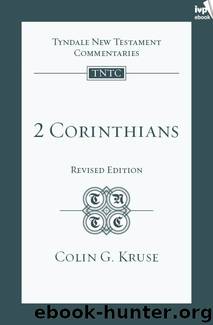2 Corinthians (TNTC) by Colin Kruse

Author:Colin Kruse [Kruse, Colin]
Language: eng
Format: epub
ISBN: 9780830842889
Barnesnoble:
Publisher: InterVarsity Press
Published: 2015-07-04T16:00:00+00:00
Theology
In 4:7–18 Paul juxtaposes statements about present sufferings in the carrying out of his ministry that contribute to his outward wasting away with the inward renewal that enables him to persevere. He likens himself to a cheap and fragile clay jar, but one that bears an invaluable treasure: the light of the gospel of the glory of God displayed in the face of Christ. The immense privilege of being a minister of this gospel is one reason why he does not lose heart amidst his afflictions. The other reason is that God compensates the effects of his outward afflictions with inner renewal through the work of the Spirit. He endures the sufferings for two reasons: firstly, for the benefit of those to whom he ministers so that they will experience God’s blessings as a result of his labours (‘death is at work in us, but life is at work in you’), and secondly, because in the light of those blessings there will be an ever-increasing volume of thanksgiving to God who bestowed them. Paul regarded the afflictions accompanying his ministry as ‘light and momentary’ in comparison with the ‘eternal glory’ they were achieving for him. Keeping his eyes fixed on what is eternal prevented him from losing heart.
In 5:1–10 Paul expresses his confidence that if his afflictions were to intensify and culminate in death, so that the ‘earthly tent’ he lives in were to be destroyed, he would have a ‘building from God, an eternal house in heaven’. In other words, if he should die and his earthly body be destroyed, God would provide him with a heavenly body, a resurrection body. This was his ultimate hope. He makes clear that his first wish was not to be ‘unclothed’ (i.e. to be disembodied), but rather to be ‘clothed’ with the heavenly dwelling, his resurrection body. However, recognizing that he might die before the parousia and the general resurrection, he says he would rather be ‘away from the body’ and be ‘at home with the Lord’, implying a conscious existence in the presence of God even in a disembodied state, something that would be better by far than being present in the body but away from the Lord (cf. Phil. 1:21–24). Paul concludes this section by saying that in whatever state he finds himself, whether ‘at home in the body or away from it’, his aim is to please God, for all believers must appear before the judgment seat of Christ to receive what is due to them according to what they have done while ‘in the body’. This is best understood not in regard to salvation, but as reward for service (cf. 1 Cor. 3:10–15).
Download
This site does not store any files on its server. We only index and link to content provided by other sites. Please contact the content providers to delete copyright contents if any and email us, we'll remove relevant links or contents immediately.
| Guides | New Testament |
| Old Testament |
The Five People You Meet in Heaven by Mitch Albom(3569)
The Secret Power of Speaking God's Word by Joyce Meyer(3220)
Real Sex by Lauren F. Winner(3023)
Name Book, The: Over 10,000 Names--Their Meanings, Origins, and Spiritual Significance by Astoria Dorothy(2987)
The Holy Spirit by Billy Graham(2953)
0041152001443424520 .pdf by Unknown(2846)
How The Mind Works by Steven Pinker(2816)
ESV Study Bible by Crossway(2778)
Ancient Worlds by Michael Scott(2688)
Churchill by Paul Johnson(2587)
The Meaning of the Library by unknow(2572)
The ESV Study Bible by Crossway Bibles(2551)
The Gnostic Gospels by Pagels Elaine(2531)
MOSES THE EGYPTIAN by Jan Assmann(2417)
Jesus by Paul Johnson(2362)
City of Stairs by Robert Jackson Bennett(2354)
The Complete Dead Sea Scrolls in English (7th Edition) (Penguin Classics) by Geza Vermes(2283)
The Nativity by Geza Vermes(2230)
Ancient Near Eastern Thought and the Old Testament by John H. Walton(2226)
